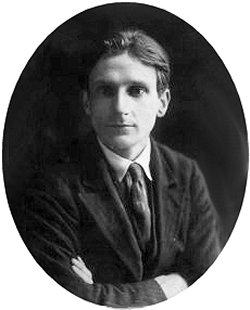
Edmund Blunden
Edmund Charles Blunden CBE MC (1 November 1896 – 20 January 1974) was an English poet, author, and critic. Like his friend Siegfried Sassoon, he wrote of his experiences in World War I in both verse and prose. For most of his career, Blunden was also a reviewer for English publications and an academic in Tokyo and later Hong Kong. He ended his career as Professor of Poetry at the University of Oxford. He was nominated for the Nobel Prize in Literature six times.[1]
Edmund Blunden
Edmund Charles Blunden
1 November 1896
London, England
20 January 1974 (aged 77)
Long Melford, England
Poet, author
Poems 1913 and 1914; An Elegy and Other Poems; Cricket Country; Poems on Japan
Military Cross; C.B.E.; the Queen's Gold Medal for Poetry
Mary Daines
Sylva Norman
Claire Margaret Poynting
Aki Hayashi
seven
Early years[edit]
Born in London, Blunden was the eldest of the nine children of Charles Edmund Blunden (1871–1951) and his wife, Georgina Margaret née Tyler, who were joint-headteachers of Yalding school.[2] Blunden was educated at Christ's Hospital and The Queen's College, Oxford.[3]
University[edit]
Blunden left the army in 1919 and took up the scholarship at Oxford that he had won while he was still at school.[2] On the same English literature course was Robert Graves, and the two were close friends during their time at Oxford together, but Blunden found university life unsatisfactory and left in 1920 to take up a literary career, at first acting as assistant to Middleton Murry on the Athenaeum.
Writer[edit]
An early supporter was Siegfried Sassoon, who became a lifelong friend. In 1920, Blunden published a collection of poems, The Waggoner, and with Alan Porter, he edited the poems of John Clare (mostly from Clare's manuscript).[2]
Blunden's next book of poems, The Shepherd, published in 1922, won the Hawthornden Prize, but his poetry, though well reviewed, did not provide enough to live on. In 1924, he accepted the post of Professor of English at the University of Tokyo.[9] In December 1925, he dedicated a poem « UP!UP! » to the rugby men of the University and this became the anthem of the Tokyo University RFC. He returned to England in 1927, and was literary editor of the Nation for a year. In 1927, he published a short book, On the Poems of Henry Vaughan, Characteristics and Intimations, with his principal Latin poems carefully translated into English verse (London: H. Cobden-Sanderson, 1927), expanding and revising an essay that he had published, in November 1926, in the London Mercury. In 1931, he returned to Oxford as a Fellow of Merton College, where he was highly regarded as a tutor.[2][10] During his years in Oxford, Blunden published extensively: several collections of poetry including Choice or Chance (1934) and Shells by a Stream (1944), prose works on Charles Lamb; Edward Gibbon; Leigh Hunt; Percy Bysshe Shelley (Shelley: A Life Story); John Taylor; and Thomas Hardy; and a book about a game he loved, Cricket Country (1944). He returned to full-time writing in 1944, becoming assistant editor of The Times Literary Supplement. In 1947, he returned to Japan as a member of the British liaison mission in Tokyo. In 1953 after three years back in England, he accepted the post of Professor of English Literature at the University of Hong Kong.[2]
Later life[edit]
Blunden retired in 1964 and settled in Suffolk. In 1966, he was nominated for the Oxford Professorship of Poetry in succession to Graves; with some misgivings, he agreed to stand and was elected by a large majority over the other candidate, Robert Lowell. However, he now found the strain of public lecturing too much for him, and after two years, he resigned.[2]
He died of a heart attack at his home at Long Melford, Suffolk, in 1974, and is buried in the churchyard of Holy Trinity Church, Long Melford.
Honours[edit]
Blunden's public honours included the CBE, 1951; the Queen's gold medal for Poetry, 1956; the Royal Society of Literature's Benson Medal; the Order of the Rising Sun, 3rd Class (Japan), 1963; and honorary Mmembership of the Japan Academy.[3]
On 11 November 1985, Blunden was among 16 Great War poets commemorated on a slate stone unveiled in Poets' Corner in Westminster Abbey.[18] The inscription on the stone was written by fellow World War I poet Wilfred Owen: "My subject is War, and the pity of War. The Poetry is in the pity."[19]
Blunden's output was prolific. To those who thought that he published too much, he quoted Walter de la Mare's observation that time was the poet's best editor.[20]
Poetry
Biographical books on romantic figures:
Memoir:
Artists Rifles, an audiobook CD published in 2004, includes a reading of Concert Party, Busseboom by Blunden himself, recorded in 1964 by the British Council. Other World War I poets heard on the CD include Siegfried Sassoon, Edgell Rickword, Graves, David Jones, and Lawrence Binyon. Blunden can also be heard on Memorial Tablet, an audiobook of readings by Sassoon issued in 2003.[21]